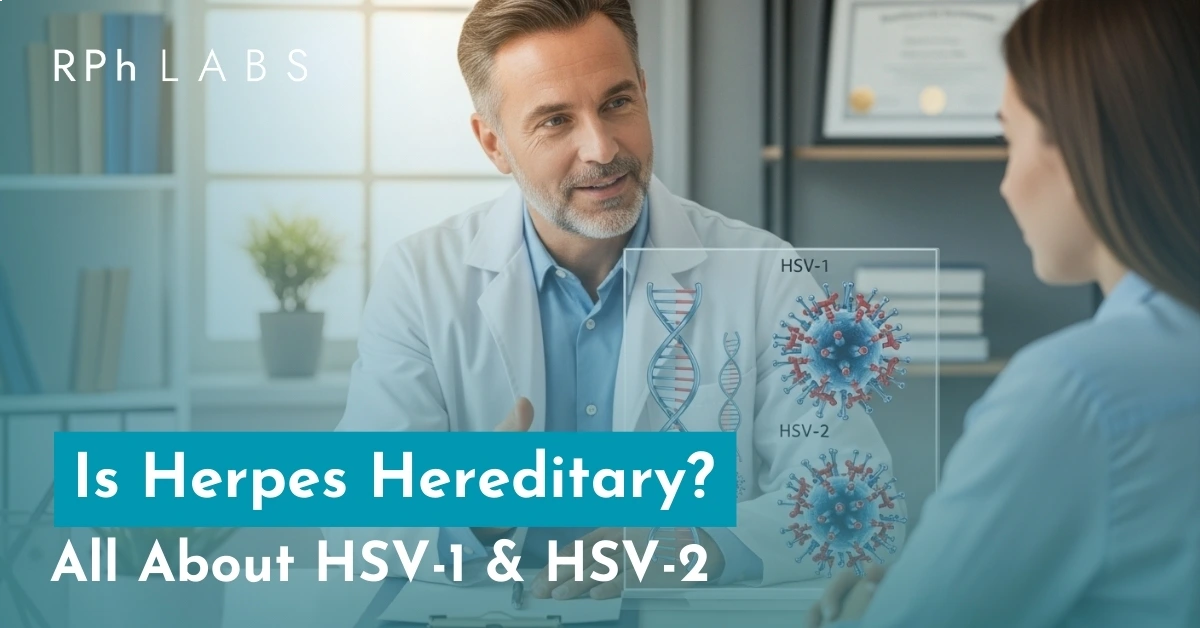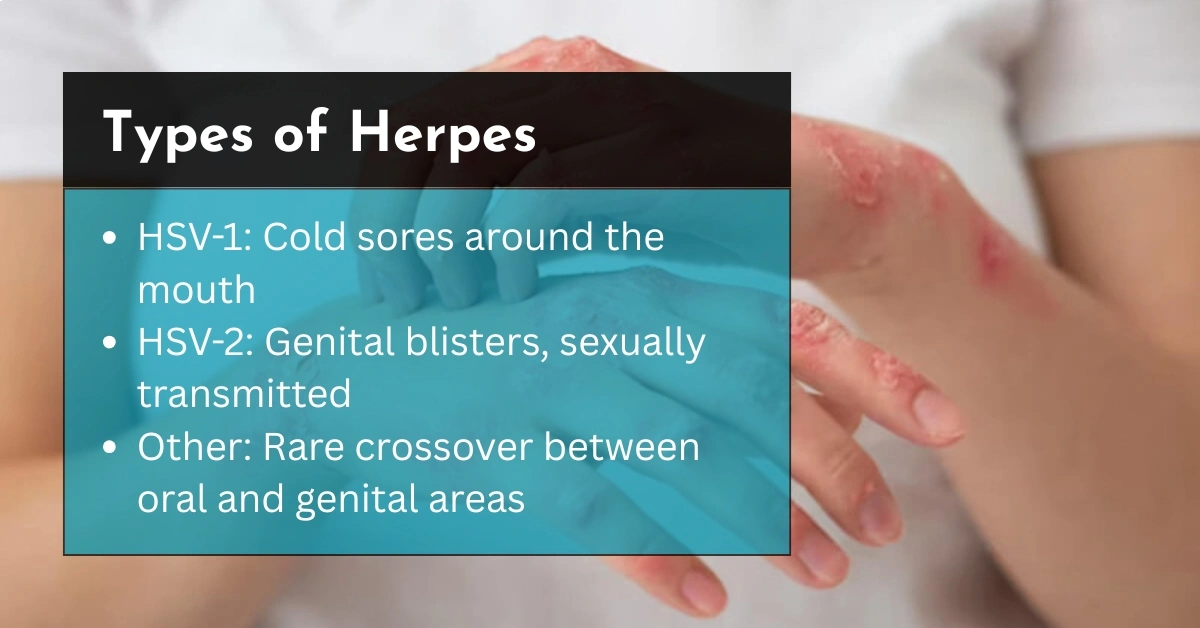
So, you’ve probably heard of herpes, and maybe even have it, or know someone who does. But is Herpes hereditary? Can your parents pass this on to you? Is there a risk if you’re pregnant? Let’s break down the key info you need to know, including the major types, causes, symptoms, and treatments. Plus, we’ll talk about the best ways to manage this common condition.
What is Herpes?
Herpes is a viral infection caused by the Herpes Simplex Virus (HSV). There are two main types: HSV-1 and HSV-2. HSV-1 primarily causes oral herpes, while HSV-2 is known for causing genital herpes. They both love to hide in your body and can “flare up” during times of stress or illness.
Types of Herpes
- HSV-1 (Oral Herpes) – The infamous cold sore virus! This type typically causes fever blisters or cold sores around your mouth.
- HSV-2 (Genital Herpes) – This one causes painful blisters in the genital area and is more commonly transmitted through sexual contact.
- Other Types – Although rare, HSV-1 can also cause genital herpes, and HSV-2 can cause oral herpes.

Is Herpes Hereditary?
The common question that is asked by everyone Is herpes a genetic disease? The short answer: No. But herpes simplex 1 and herpes simplex 2 can run in families. You won’t inherit the virus directly, but if your parents have HSV or cold sores, you may be more likely to get it. If you were exposed to the virus early on, you might even have cold sores at some point in your life. But hey, don’t worry! It doesn’t mean you’re doomed – just be mindful of exposure.
How Does Herpes Spread?
Yes, herpes is contagious, and it’s easy to pass it along without even knowing it! The virus spreads through skin-to-skin contact. Here’s how it usually works:
- Kissing – Chances of getting herpes from kissing are high if someone has a cold sore or is shedding the virus.
- Sharing drinks – You can get cold sores from sharing drinks if someone has an active outbreak.
- Sexual contact – You can get HSV-2 from unprotected sex, even when the person shows no symptoms. Yep, it can spread without visible outbreaks. But, don’t stress, we’ll talk prevention in a sec!
Can People with Herpes Have Kids?
Yes, people with herpes can have kids! However, there are chances of its transfer, thus always check with your doctor if you are planning to have a baby. If you have an active outbreak during delivery. Herpes in infants can be dangerous, so doctors usually recommend a C-section if the mother has active HSV-2 during delivery to prevent transmission.
Did you know?
Pharmacogenomic testing, commonly known as PGx testing, gives insights into your genetic makeup, allowing your doctor to tailor your drug (especially mental health) and dosage.
Symptoms of Herpes
Symptoms can vary. For some, herpes is a quiet guest—no symptoms at all. For others, it can be a painful flare-up. Here’s what to look out for:
- Oral herpes: Cold sores, fever blisters, or pain around your mouth, just like the oral STD infection.
- Genital herpes: Painful blisters or sores around the genital area, itching, and flu-like symptoms.
- Initial infection: Can be worse and last longer (up to a few weeks), but recurring outbreaks are often shorter and milder.
Causes & Risk Factors
- HSV-1: Typically transmitted during childhood via non-sexual contact like kissing.
- HSV-2: Primarily spread through sexual activity (though HSV-1 can also be transmitted this way).
- Genetic risk?: If someone in your family has a history of cold sores, your chances of getting HSV-1 might be higher.
Prevention of Herpes
Please note that using dental dams or condoms does not give you complete protection; they only minimize the chances of you getting the disease. Here’s how to reduce your risk:
- Avoid direct contact with cold sores or genital herpes lesions.
- Use condoms or dental dams during sex, even if your partner doesn’t have visible sores.
- Don’t share personal items like lip balm, towels, or razors.
- Avoid kissing someone with an active cold sore.
While PGx testing may not be relevant in Herpes medications, it shows how you may respond to 250+ medications. Check if yours is on the gene-drugs list.
Can You Have a Healthy Pregnancy with Herpes?
If you have genital herpes and you’re planning to get pregnant, don’t worry. Talk to your doctor about antiviral treatment, and if you’re in the clear by the time you deliver, you can have a safe, healthy pregnancy. But if you have active sores, be prepared for extra monitoring to ensure a safe delivery for both you and the baby.
Best Medications for Herpes
While there’s no cure for herpes (yet!), as confirmed by the Cleveland Clinic, there are medications that can help keep outbreaks under control:
- Acyclovir (Zovirax) – Can be taken orally or applied topically. It helps shorten the duration of outbreaks.
- Valacyclovir (Valtrex) – This one is super popular for managing HSV-2 and can also help prevent transmission.
- Famciclovir (Famvir) – Another option for managing outbreaks and reducing the risk of transmission.
Foods to Avoid with Herpes
Certain foods can trigger outbreaks, so here’s what to keep in mind:
- Chocolate – Contains arginine, which may trigger outbreaks.
- Nuts – Again, arginine can be an issue.
- Acidic foods like citrus fruits or tomatoes can irritate cold sores.
Foods that Help Prevent Herpes
Some foods can actually help your immune system keep herpes at bay:
- Lysine-rich foods like yoghurt, eggs, and fish.
- Vitamin C – Boosts immunity and can reduce flare-ups. Try oranges, peppers, and spinach.
- Probiotics – A healthy gut can help keep the virus from reactivating.
Final Thoughts
While herpes simplex 1 genetic factors can influence susceptibility, the virus itself isn’t passed down directly like some other genetic conditions. And yes, cold sores can be genetic, meaning if your family has a history, your chances of getting it go up, but there’s no guarantee.
Frequently Asked Questions
While herpes simplex virus (HSV) isn’t directly inherited, if your family has a history of cold sores or genital herpes, your chances of getting infected might be higher. It’s like getting the “family cold sore gene,” but it’s not an automatic pass.
Yes! Chances of getting herpes from kissing are high if the other person has a cold sore. It’s like a secret handshake the virus shares. Be cautious around those active outbreaks!
You sure can! If someone’s got a cold sore, and you share a drink, the virus can hop over from their lips to yours. So, let’s keep the cup-sharing to a minimum, especially if there are cold sores involved.
Cold sores themselves aren’t passed down genetically, but if your family has a history of HSV-1, you might be more prone to catching it. It’s like inheriting the risk, not the actual cold sore.
Yes, but don’t panic! Doctors keep a close eye on things. C-sections are often recommended to reduce the risk; however, the chances remain. Always check with your doctor if you’re pregnant and dealing with herpes.
Disclaimer: This blog is for informational purposes only and does not constitute medical, legal, or professional advice. While we strive for accuracy, errors or omissions may occur.



Leave a Reply